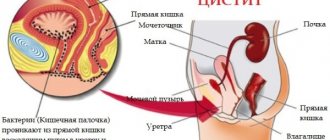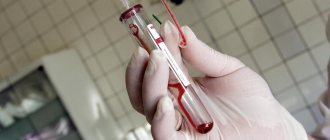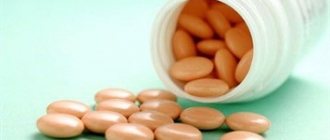Cystitis is an inflammatory process of the mucous membrane of the bladder and one of the most common diseases among the fair sex. It can simultaneously be classified as urological and gynecological. Every second woman encounters this problem at least once during her life. The pathology is most typical for females of reproductive age 20-45 years. In 20-30% of cases, the disease becomes chronic. It is characterized by exacerbation of the disease twice a year or more.
Causes of cystitis
The following causes of the disease are identified:
- Infections. A common cause of cystitis are representatives of gram-negative flora (80%) - Escherichia coli, Proteus, Enterococcus, Klebsiella. About 20% are gram-positive microflora (staphylococcus, streptococcus), ureaplasma, chlamydia, fungi, viruses, helminths, zoonotic infection. The most common method of infection is ascending. This occurs when bacteria enters the genitals or anus and travels through the urethra into the urinary organs. A contributing factor may be a decrease in immunity due to hypothermia of the patient's body. This route of transmission of infection is observed in 86% of cases. Less common is the so-called descending route - penetration of infection through the blood or lymphatic tract. This occurs when there is any focus of chronic infection in the body (caries, sore throat). Cystitis during pregnancy occurs in the presence of microorganisms and decreased immunity due to changes in hormonal levels.
- Taking medications. Sometimes patients suffering from chronic diseases of the musculoskeletal system or cancer are forced to take cytostatics. Such drugs cause inflammation in the genitourinary organs as a side effect. This is caused by the release of acrolein during the metabolism of the drug, which has an irritating effect on the mucous membranes. In this case, medicinal cystitis develops.
- Allergic reaction. The development of acute cystitis is due to the individual characteristics of the body - a reaction to certain allergens that cause inflammation in the bladder. Subsequent knowledge of how the disease manifests itself will help avoid the development of the inflammatory process.
In 80% of cases, E. coli (Escherichia coli) is the cause of cystitis.
In women, cystitis develops much more often, which is due to anatomical features. The urethra is very close to the entrance to the vagina, and the anus is also located nearby. If the rules of intimate hygiene are not followed, E. coli can easily penetrate the urinary tract.
Development of cystitis in women.
Cystitis occurs 4 times more often in women than in men.
The main cause of the disease is a bacterial infection.
Sometimes non-infectious (aseptic) cystitis occurs. This condition develops when the mucous membrane is damaged by instruments during medical research, by stones during urolithiasis, or by the introduction of various chemicals into the organ. Radiation and chemotherapy can also cause inflammation in the bladder. It should be borne in mind that such cystitis quickly becomes infectious due to the attachment of microorganisms.
Development of inflammation in children
Girls get sick more often than boys. Common causes of the development of the disease between the ages of 4 and 12 years are as follows:
- Pathologies of the genital organs.
- Disorders in the structure of the organs of the urinary system.
- Failure to comply with the rules of genital hygiene.
- Reduced level of immunity: various vitamin deficiencies, mental disorders, poor quality diet.
- Hypothermia.
- The use of medications that cause inflammation.
- Genetic predisposition.
Symptoms manifest themselves in the same way as in adults: difficulty urinating, changes in the color and smell of urine, and the presence of sediment in it.
The development of the disease in childhood is associated with a lack of washing skills and knowledge about proper wiping after defecation.
A teenager is susceptible to infection at the beginning of active sexual life. In girls, the ovaries do not yet produce enough hormones to maintain the protective functions of the vaginal mucosa. Vaginitis and vulvitis are common causes of cystitis.
Treatment is selected more carefully, sometimes even refusing to use antibiotics is possible. Or they are prescribed a specific group to which the pathogens are sensitive in this case, in order to avoid harmful effects on other organs and systems of the fragile organism.
Provoking factors
There are predisposing factors, the presence of which increases the likelihood of developing the disease. The bladder mucosa has effective mechanisms that prevent infection from entering it. A decrease in local immune defense is facilitated by:
- Hormonal disorders.
- Hypothermia.
- Hypovitaminosis.
- Accompanying illnesses.
- Postponed surgeries.
- Chronic constipation.
- Prolonged sitting.
- General immunodeficiency.
Impaired urine flow is another factor that often provokes the occurrence of cystitis. This may be caused by:
- Prostatic hyperplasia (adenoma).
- Weakness of contractile activity of the muscular layer of the bladder.
- Disturbances in the regulation of the act of urination on the part of the nervous system.
- Narrowing of the lumen of the urethra (urethra), which, for example, is often noted after sexually transmitted diseases.
Prostate adenoma interferes with the flow of urine.
Also provoking factors for the development of cystitis are:
- Sex with a lot of partners. Frequent changes and unprotected sex lead to cystitis. True, this is the best case scenario. More often, acute cystitis becomes a manifestation of one of the sexually transmitted infections.
- Changes in blood circulation in the pelvic area, which is caused by wearing tight underwear, tights, and sedentary work. Leads to favorable conditions for the proliferation of microbes and promotes the inflammatory process.
- Chronic kidney disease. Their presence contributes to the disease and leads to a decrease in immunity.
- Intestinal diseases. In this case, pathogenic microflora is activated, which penetrates the urinary tract.
- Nutritional – errors in the diet cause irritation in the bladder mucosa and symptoms of cystitis appear.
- Changes in hormonal levels during diabetes, menopause, obesity. It leads to a decrease in immune status, and against this background it is easier for microbes to penetrate the mucous membrane and cause inflammation.
- Contraception with spermicides, use of contraceptive diaphragms.
- Gynecological diseases that change the normal microflora of the vagina.
Unprotected sex provokes the appearance of cystitis.
Clinic services
Patients can continue to be monitored by one specialist after recovery. A tendency to cystitis usually manifests itself in repeated recurrences of the disease. Regular examinations and tests allow you to keep the situation under control and begin treatment at the slightest sign of illness. Any infection will be a reason to prescribe therapy to prevent the development of cystitis.
This approach to health is a good way to avoid acute and chronic diseases. Treatment in this case is faster and more effective. The risk of developing age-related complications after frequent inflammation is reduced.
To make an appointment, you can call the clinic or fill out the feedback form. Choose the branch that is most conveniently located for you. Appointment times are strictly observed, which allows you to clearly plan the interval of visiting a specialist.
Classification of cystitis
In the practice of a doctor, there is a classification of cystitis, which distinguishes:
- Primary and secondary.
By etiology:
- Infectious (indicating the pathogen).
- Non-infectious (chemical, medicinal, allergic, food).
With the flow:
- Spicy.
- Chronic (duration more than 3 months).
According to the spread of the inflammatory process:
- Focal.
- Diffuse.
According to the presence of complications:
- Uncomplicated - develops with unchanged urinary tract, without concomitant diseases and provoking factors. About half of patients are subsequently diagnosed with an occult kidney infection.
- Complicated – occurs against the background of functional and organic changes in the bladder, the presence of concomitant diseases of the internal organs, after instrumental research methods. Complicated conditions also include old age, hospital infection, and pregnancy.
Pathogenesis of cystitis.
Diagnostics
The presence of characteristic symptoms does not allow us to speak specifically about cystitis. At an early stage, a person may simply not notice the violations. Additional laboratory tests are necessary to make an accurate diagnosis. Recognition of pathology consists of a number of activities:
- Study of anamnesis: clinical picture of the disease, individual manifestations, duration of unpleasant sensations.
- Examination by a urologist. Palpation of the suprapubic region is used. In this case, if inflammation is present, a sharp painful symptom occurs.
- General urine analysis. An increase in the number of leukocytes and protein, mucus, red blood cells may indicate an inflammatory process.
- Bacteriological culture of urine. The procedure allows you to identify the pathogen and determine its sensitivity to antibiotics.
- Consultation with a gynecologist and gynecological tests: bacteriological and microscopic analysis, PCR smear examination.
- Ultrasound of the genitourinary system. The examination helps determine the size, shape, contours of organs and the presence of echo-negative suspensions.
- Cystoscopy and cystography. They are necessary to determine the morphological appearance of the bladder, the presence of neoplasms, and foreign bodies.
- Endoscopy and biopsy. Research is carried out strictly according to indications.
Clinical symptoms of cystitis in women and men
Clinical symptoms of the disease last about a week, reducing the patient’s capacity and activity for 3-4 days.
Typically, symptoms of acute cystitis in a woman appear after suffering from hypothermia, after menstruation, sexual intercourse, or defloration. Risk factors in premenopausal women include a history of acute cystitis in the past and sexual activity. In women who do not have sexual intercourse, the disease rarely develops.
Cystitis develops less frequently in men, and the symptoms do not differ from the classic ones. The first signs of cystitis appear 2-3 days after sexual intercourse, and the risk of its occurrence increases when using spermicides.
As the disease develops, the following symptoms are observed:
- Urge for frequent imperative urination, during which pain, pain and burning occur in the urethra. Urination in small portions with a feeling of incomplete emptying of the bladder.
- Pain and discomfort. The first and most common symptom of cystitis. Patients complain of unpleasant painful sensations in the perineum and lower abdomen. The intensity varies. Sometimes the disease is asymptomatic - on average in 10% of cases, and patients do not attach any importance to this. This leads to chronicity of the process and the development of complications. Patients may also complain of slight pain in the lower abdomen with radiation to the back, which causes difficulties in diagnosis.
- Burning, itching. It is the most characteristic symptom of the disease.
- Fever, headache, malaise, increased fatigue, decreased performance.
- The appearance of blood in the urine is hematuria. Depending on the amount of urine, the color of urine can range from pale pink to brick. The presence of blood indicates a viral etiology of the disease. In severe cases of the disease, sharp pain occurs when urinating and the release of droplets of blood at the end of urination.
- The urine of patients with cystitis has a characteristic cloudy color and an unpleasant odor.
- When palpated in the suprapubic region, patients complain of pain.
The most common symptom of cystitis is pain in the perineum and lower abdomen.
Pathogenesis of cystitis in women.
Pathogenesis of cystitis in men.
Pain and frequent urination are symptoms of cystitis.
If acute cystitis is not treated, or when therapy for the disease is incomplete, the process becomes chronic. During periods of remission there are no manifestations of cystitis, but during exacerbations the same symptoms occur as in acute pathology.
The doctor talks about the symptoms of cytitis
Prognosis and complications
Cystitis is a painful and debilitating condition, which is dangerous because the infection can reach the kidneys through the ascending tract. If treatment is carried out on time, then most patients do not experience complications. Damage to kidney tissue in advanced cases can lead to irreversible changes.
The development of pyelonephritis threatens the following complications:
- arterial hypertension;
- renal failure;
- purulent processes (abscesses, carbuncles);
- bacteremic shock, in which pathogenic microorganisms enter the general bloodstream.
In order to prevent the occurrence of cystitis in women, it is necessary to strictly adhere to hygienic practices, timely treatment of infectious pathologies of the gastrointestinal tract and organs of the reproductive system, since the main cause of this disease is the entry of bacteria along the ascending path through the urethra.
If symptoms of acute cystitis appear, hospitalization in a hospital and treatment under the supervision of a doctor is necessary.
Cystitis during pregnancy
During pregnancy, immunity decreases, which becomes one of the risk factors for acute cystitis. This condition is an adaptive reaction of the body to pregnancy and prevents embryo rejection. Because of this, the microorganism, entering the bladder, quickly causes an inflammatory process.
Cystitis can develop in early pregnancy, but the disease has the same symptoms as in the classic development of the disease. The pathology should be differentiated from frequent urination, which occurs in a pregnant woman due to an enlarged uterus and compression of the bladder. In this case, the woman does not experience the discomfort and unpleasant sensations that are characteristic of cystitis. After 3 months, the uterus lifts up and stops putting pressure on the bladder - everything returns to normal and the symptoms disappear.
Pregnancy is a risk factor for cystitis.
Symptoms of cystitis in children are varied and include:
- General symptoms are fever, chills, intoxication, dyspeptic symptoms.
- Pain syndrome is the appearance of pain in the lower abdomen, in the side, in the urethral canal when urinating.
- Dysuric disorders - leakage, urinary incontinence day and night, not previously encountered, imperative urges, frequent urination.
Clinical manifestations vary depending on the age of the child. In young children, general symptoms predominate. There are no specific ones and children at this age cannot always indicate the complaints that bother them.
In older children, the general condition is slightly disturbed, as a result of which there are no signs of intoxication or fever. Here dysuric disorders and pain syndrome come to the fore.
How to treat cystitis: list of drugs
Most often, when drawing up a treatment regimen for a disease in women, doctors necessarily include drugs such as uroantiseptics (antibiotics) and anti-inflammatory drugs in the therapeutic process. This treatment allows you to quickly get rid of the symptoms of cystitis and overcome the infection.
1) Analgesics and antispasmodics for symptomatic treatment, they will eliminate spasms and help reduce the tone of the smooth muscles of the bladder:
- No-spa - 120-240 mg per day in 2-3 doses;
- Papaverine - 40-60 mg 3-4 times a day;
2) When the diagnosis is confirmed and already known to the woman, antibiotics are prescribed for etiotropic treatment:
- Monural - 3 mg once, 2 hours after meals;
- Nolitsin - 1 tablet 2 times a day, for 3 days;
- Biseptol - 2 tablets 2 times a day, for 3 days;
3) Herbal preparations also help reduce spasm and pain:
- Cyston - 2 tablets 2 times a day;
- Canephron - 50 drops 3 times a day, diluted in a small amount of water;
- Spasmocystenal - up to 10 drops 3 times a day, diluted in a small amount of water;
- Phytolysin - 1 tsp. Dissolve the paste in 1/2 glass of warm sweet water, take 3-4 times a day after meals.
The choice of a suitable drug for cystitis, the determination of its single dose, the order of administration and the duration of the treatment course should be in the exclusive competence of the doctor. Self-medication not only does not contribute to a quick recovery, but also entails the development of serious complications of the disease.
In case of a recurrent form of the disease, in addition to the above-mentioned etiotropic and symptomatic therapy, bladder instillations, intravesical iontophoresis, UHF, inductothermy, magnetic laser therapy, and magnetotherapy are indicated.
If recurrent cystitis is diagnosed in a menopausal woman, intravaginal or periurethral use of estrogen-containing creams is recommended. With the development of gross hyperplasia of the bladder neck, they resort to transurethral resection - TUR of the bladder.
Monural
It is the most common and modern drug in the fight against such a disease. It has high bactericidal activity against almost the entire spectrum of pathogenic microorganisms.
The active ingredient of the drug is fosfomycin trometamol. It is absolutely safe for use even in pregnant women and children.
At the same time, 1 package once a day is enough to solve health problems. That is why, when women have a question about how to treat cystitis, they choose Monural from a variety of medications
As you know, any disease is easier to prevent than to treat. Therefore, a person with a chronic form of cystitis needs to closely monitor their health. Avoid hypothermia and prolonged exposure to frost. These simple measures will prevent the development of the disease.
Regimen for the treatment of cystitis
Treatment of cystitis at home includes following the following recommendations. You need to adhere to bed rest. You should only go to a warm toilet so as not to aggravate the disease. During treatment of cystitis, it is necessary to avoid sexual intercourse.
The following foods should be avoided in your diet:
- Fat.
- Too spicy.
- Salty.
- Alcohol.
- Carbonated drinks.
The consumption of these products has an irritating effect on the walls of the bladder. During the period of illness, it is important to drink more fluid, up to 2 liters per day.
For example, for cystitis, cranberry juice is recommended. It allows the body to quickly cope with the manifestations of the disease, and its use makes urine less suitable for the proliferation of microorganisms. It is best to choose freshly squeezed juice, and you should not use a packaged drink. You can make your own cranberry juice.
Cranberry juice is useful for cystitis.
Lingonberry is another berry, the use of which is useful for bladder inflammation. The active substances it contains have a disinfecting effect. In order to prepare a healthy drink, you need to pour a tablespoon of berries with a glass of boiling water and let the product brew.
Other therapies
Folk remedies are used to alleviate the condition. The simplest recipes will help you quickly relieve inflammation and pain.
The baking soda solution is quite easy to prepare and has high effectiveness, confirmed by more than one generation. Thanks to the alkaline environment and antibacterial properties, the very first use of the drink gives an effect: it helps relieve pain and reduces the frequency of urges. Half an hour after this, take an analgesic tablet along with orange juice (2 glasses) and place a warm heating pad on the stomach. It is necessary to warm up for up to 2 hours, periodically replacing the water. It is recommended to supplement treatment with cranberry juice, chamomile tea, and birch leaf tincture.
Millet is an effective weapon in the fight against the disease. A suspension is prepared from it, a tincture is steamed, and consumed in its traditional form: added to soup, cooked porridge.
Traditional medicine suggests using the healing properties of plants in the form of tinctures, decoctions, and teas to treat cystitis. For this purpose, a decoction of flax seeds, birch buds, juniper, tincture of bearberry or plantain, and licorice root are used.
There are also ready-made medications of natural origin. Currently, much attention is paid to the treatment and prevention of cystitis with medications based on cranberry extract.
There are combination products created on the basis of medicinal preparations, for example “Uroprofit”. The combined properties of the components have a therapeutic effect and provide a preventive effect, preventing the occurrence of relapses in the future.
Reviews from patients who have used traditional methods speak of their effectiveness, ease of preparation, and low cost.
Antibacterial drugs
In the treatment of cystitis, antibacterial drugs are used, their prescription is carried out by the attending physician based on the results of bacteriological examination of smears and cultures.
For acute uncomplicated cystitis, the duration of treatment with antibiotics is 3-5 days, and for chronic cystitis with relapses - at least 7-10 days.
The following drugs may be prescribed:
- Nitrofurans (furadonin).
- Fluoroquinolones (norfloxacin, levofloxacin, pefloxacin).
- Macrolides (monural).
- Cephalosporins (Suprax).
The active ingredient of furadonin is nitrofurantoin. This is a remedy with a wide spectrum of antimicrobial activity, effective, including against E. coli. The drug is contraindicated in case of individual intolerance, severe chronic renal and heart failure, liver cirrhosis, chronic hepatitis. Furadonin is not used during pregnancy, breastfeeding, or in children under 1 month of age.
Furadonin.
Norfloxacin is available under such trade names as Normax, Norilet, Loxon-400, Norbactin. The drug promotes the death of bacteria from many groups. It is not used by people under the age of 18, pregnant or breastfeeding women, or those who are intolerant to any fluoroquinolones.
The active ingredient of monural is fosfomycin. This drug has a powerful and quickly onset antimicrobial effect. The product inhibits the synthesis of bacterial cell walls. Monural is contraindicated in children under five years of age, with severe renal failure and intolerance to the drug. It can be used during pregnancy and lactation only when the benefit to the mother outweighs the risk to the fetus.
Monural.
Suprax is a 3rd generation cephalosporin for oral administration. The drug is active against many gram-positive and gram-negative microbes, but enterobacters, some staphylococci, and Pseudomonas aeruginosa are resistant to it. This antibiotic is not used in case of hypersensitivity to it, lactation and in children under six months of age.
Prevention
Measures to prevent cystitis in women include:
- prevention of hypothermia;
- adequate fluid intake;
- timely and regular emptying of the bladder;
- use of a condom by a sexual partner during sexual intercourse;
- refusal of alcoholic beverages;
- normalization of vaginal microflora;
- treatment of existing diseases of the genital organs (colpitis, endometritis);
- increased physical activity;
- good nutrition;
- washing the genitals and perineum after each visit to the toilet;
- daily change of underwear;
- Frequently changing pads or tampons during menstruation.
Prevention of the disease should be carried out from a young age.
Necessary examination
Signs of cystitis cannot be ignored. Among the weaker half of humanity, there is a tendency to the chronic form. Sluggish cystitis can lead to serious complications, even life-threatening. If you have a triad of characteristic symptoms (pain, dysuria, changes in the appearance of urine), you should contact a urologist. If necessary, the specialist will give a referral to a nephrologist (if there is a suspicion of kidney disease) and a gynecologist (for examination for sexually transmitted infections). Diagnosis is based on the collection of patient complaints and laboratory test data. To establish the nature of inflammation of the bladder, the following is prescribed:
- clinical urine analysis - the number of leukocytes increases, false glucosuria is possible, mucus, pus, red blood cells, epithelial cells are detected;
- general blood test - reflects the presence of active inflammation in the body; with infectious cystitis, the level of leukocytes increases significantly;
- blood biochemistry - provides information about the condition of the whole body and kidneys, in particular (based on the level of uric acid, creatinine);
- bacterial culture of urine - helps to establish the nature of the causative agent of inflammation and select an effective antibiotic to eliminate it;
- Ultrasound is a visualization method that allows you to detect signs of inflammation of the bladder membranes, defects, ulcers, granulation, crystal deposition, cysts, ulcers, fistulas, perforation;
- cystoscopy is an informative diagnostic method in which you can clearly examine the condition of the membranes, determine the type of cystitis, assess the risk of complications, and check the integrity of the organ.
When going to a nephrologist, you need to have the results of a biochemical analysis with you. The gynecologist will prescribe a smear from the vagina and cervical canal to assess the composition of the biocenosis. If there are symptoms of a specific infection, PCR and ELISA diagnostics for certain pathogens may be prescribed.
Prevalence of the disease
Bladder inflammation affects mainly young women. The disease also occurs in men, but at an older age (70-75 years). Despite the fact that the symptoms quickly stop and relief occurs, half of the patients experience several relapses per year (3 or more). In most cases (90%), each subsequent infection is caused by another pathogen that entered from the intestine.
Frequent relapses are explained not only by the reasons described above, but by the following factors:
- lack of proper treatment for cystitis;
- re-infection;
- peculiarities of sexual life;
- presence of sexually transmitted diseases;
- uncontrolled use of antibiotics and self-medication.
What to do if symptoms appear
I won’t hide it, I am very familiar with the sensations of cystitis. When your bladder is on fire, you can’t get off the toilet and it’s like you’re being cut by a hot iron.
That is why it is not entirely appropriate to recommend seeing a doctor (and not necessarily on the same day), waiting in line, getting tested, waiting for their results, and then starting treatment. Simply because it is not feasible when the count is literally minutes, and every second of life is torture. Only a person who has never encountered cystitis can recommend that you wait a few days until you see a doctor and not do anything on your own.
If you have a doctor you know who you can call and consult, or the opportunity to see a specialist immediately, or you can tolerate the pain until you see a doctor, then, of course, it is wiser to do so.
However, if you cannot see a doctor immediately, and you cannot bear the pain, it is reasonable to act as follows.
- Purchase at the pharmacy 3 jars for urine tests and a narrow-spectrum antibiotic for the treatment of genitourinary diseases (for example, Monural, which is used once).
- Try to collect urine for analysis in three different containers. As a rule, a quantity of literally 20 ml is sufficient for analysis. Before collecting urine, it is important to wash yourself well and use a tampon (so that discharge from the vaginal opening does not get into the urine).
- After you have managed to relieve yourself, take Monural once, following the instructions. This is the fastest treatment and noticeable relief will come literally within an hour. Be sure to take an antibiotic only after you have collected tests, otherwise the latter will be uninformative due to the antibiotic.
- The urine collected for analysis should be taken to the laboratory (commercial institutions are open even on weekends) and a general urine test, Nechiporenko test and urine culture should be ordered. It is worth knowing immediately when the results will be ready, since they will play a decisive role for the doctor in correct diagnosis and choice of treatment tactics.
- After this, you should make an appointment with a urologist (this is the name of a doctor who specializes in diseases of the genitourinary system, including women) to complete the treatment. It is very good if by the time of your appointment you already have at least some test results in hand.
How to prevent relapses
Prevention of cystitis is as follows.
- Compliance with all doctor’s recommendations and complete follow-up treatment of acute cystitis.
- Condom protection during promiscuous sexual intercourse and frequent changes of partner.
- Maintain intimate hygiene for yourself and your partner before and after sexual intercourse.
- Mandatory urination after intimacy. Reviews from girls online confirm that this is a very useful rule.
- Drinking regime in an amount of at least 2 liters per day.
- Physical activity and avoiding prolonged sitting in one place (take breaks, mini-exercise, walk, etc.)
- Diet excluding spicy, salty, fried, alcohol. Eating a variety of foods prepared in a gentle way: baking, stewing, boiling, steaming.
- Dress according to the weather, avoid sitting in the cold.
- Comfortable underwear made of natural cotton.
What I want to add in conclusion. It was not without reason that I focused attention on the importance of correct and complete treatment of acute cystitis, which happened for the first time in my life.
Many of my friends encountered this disease only once, after which, having been properly treated by a competent specialist, they forgot about cystitis once and for all.
I completely forgot about this disease after the birth of two children. Therefore, from my personal example, I know that childbirth heals the female body, and I wish the same for you!
Why is it dangerous?
Untreated or incorrectly treated cystitis can cause a woman a lot of inconvenience in the future, namely.
- Go into a chronic form. In this case, the symptoms will not be as severe each time, but the disease will return again and again, every 1-3 months.
- Spread to neighboring organs and cause pyelonephritis - inflammation of the kidneys. You will know this by the terrible pain in the lower back and body temperature above 38.5 degrees.
- Cause dystrophy of the mucous membrane of the bladder, as a result of which it is not able to contain the required amount of urine, and the woman needs to visit the toilet very often because she is unable to tolerate it. This condition is also called interstitial cystitis.
- In the elderly and women with weakened immune systems, it can lead to urinary incontinence and the need to constantly wear huge gynecological pads.
Traditional methods of treatment
For cystitis, all herbs with a diuretic and anti-inflammatory effect are useful. To speed up the relief of inflammation, brew chamomile, yarrow, corn silk, horsetail herb, calendula, bearberry, lingonberry, and currants. Pharmacies sell ready-made mixtures with diuretic, restorative and anti-inflammatory components (Brusniver, Nephrofit, diuretic mixture). People during cystitis recommend consuming:
- propolis tincture (15 drops with water three times a day);
- fir or juniper essential oil (1 drop per sugar twice a day);
- all berry juices in diluted form;
- cranberry juice;
- rosehip infusion.
The first signs of bladder inflammation
Symptoms depend on the nature of the inflammatory process. In a chronic course, they can be erased and intensify only with exacerbation. Acute cystitis begins with characteristic symptoms:
- frequent urge to go to the toilet;
- painful urination.
The development of the disease occurs rapidly, the patient’s condition can worsen every hour. At first these are only local manifestations, but when the process is advanced, general symptoms can be added.
Popular questions
Hello.
I have cystitis at an early stage, I started taking medications, curdled, I would even say, liquid discharge appeared, what could this be connected with? There is no pain, no irritation, no discomfort either. I was worried about the appearance of discharge... Hello! Cystitis is an inflammatory disease caused by specific or nonspecific microorganisms. In this case, the infectious factor can spread not only in the urinary system, but also in the reproductive system. Therefore, discharge from the genital tract appeared. For successful treatment, consult a doctor and determine the infection. This will allow you to prescribe rational treatment. At this stage, you can use Gynocomfort gel with tea tree oil. It contains medicinal herbs, bisabolol, which has an anti-inflammatory effect, and lactic acid will replenish the balance of the pH of the environment and lactobacilli. The gel is used in 1 dose 1 time per day for 7-14 days.
Hello, I am diagnosed with chronic cystitis. Relapses every year. I donated urine. Leukocytes were elevated 10-12. Now the culture and urine tests are ideal. Ultrasound of the bladder and kidneys also revealed nothing. She was treated with Monural (2 packets), then with norfolaxicin (10 days). The acute pain went away, but the itching, burning sensation and nagging pain after going to the toilet after bowel movements remained. And before the recurrence of cystitis, there was frequent urination, it felt like the bladder was constantly full even after urinating. Tell me what tests need to be taken and what they are called. If you take it in a private laboratory, what narrower tests should you undergo and which doctors should you contact? What do you need to go through? I was going to get pregnant... And how to support the body before taking tests so that acute pain does not return? I am now drinking furadonin, herbs, cystone, phytolysin. Thank you in advance.
Hello! This is a disease of the urinary system, so examination, treatment and rehabilitation before planning pregnancy should be done by a urologist.
Hello! I take Furamag and Canephron in parallel for cystitis, the question is, is it possible to take Canephron during menstruation? As far as I know, lovage is not recommended for uterine bleeding, but it is part of Canephron, nothing is written in the contraindications, but I decided it was better to ask a specialist, thanks in advance for the answer!
Hello! The drug Canephron contains a combination of several medicinal herbs in therapeutic doses, so there will be no increase in the volume of menstruation or uterine bleeding. The drug can be taken during menstruation.
Good afternoon, Oksana Anatolyevna! I was tormented by cystitis after PA, discomfort (irritation) during and after PA, opportunistic flora, cystoscopy results were good. Which gel is better to use?
Hello!
Postcoital cystitis most often develops due to lack of hydration of the genital organs and microtrauma of the mucous membranes. I recommend using Ginocomfort gel with mallow extract before contact as a lubricant and prophylactic agent. The frequency and duration of use are not limited. For an accurate diagnosis, contact a specialist
Treatment of bladder inflammation
Treatment of cystitis includes drug therapy and lifestyle adjustments. Among the medications, a woman can be prescribed:
- Antispasmodics (No-Shpa, Spazmalgon). They help reduce pain when urinating and relax the smooth muscles of the urinary tract.
- Antibiotics. Prescribed for infectious etiology of cystitis.
- Anti-inflammatory drugs. Can be used of both plant and synthetic origin. Medicines in this group alleviate symptoms for the patient by reducing inflammation and relieving swelling.
- Herbal remedies. You can use herbal teas or medicines based on herbal ingredients. In terms of potency, they are inferior to synthetic drugs, but have one advantage - a wide spectrum of action. Natural remedies usually produce a complex composition, thanks to which the combination of herbs helps reduce pain, relieve inflammation, kill infection and speed up the healing of the mucous membrane.
Antibiotics and uroantiseptics are used to fight infection. The second group includes drugs of the nitrofuran series, which have antimicrobial activity and accumulate in high quantities in the urine. This gives them the ability to effectively fight pathogens and quickly improve the patient’s well-being.
During treatment of cystitis, patients should adhere to the following recommendations:
- Try to drink plenty of water and go to the toilet more often, despite painful urination. This will help reduce the acidity of urine and quickly remove pathogens or irritants from the body.
- Warm baths or a heating pad will help slightly reduce pain when urinating. However, with infectious cystitis, such procedures are not always permitted.
- The most effective plants for treating the urinary tract are bearberry, cranberry and lingonberry. And by taking chamomile decoction orally, you can speed up the healing of the mucous membrane.
- Self-medication for cystitis is unacceptable. It is imperative to identify the cause of inflammation and complete the treatment regimen prescribed by the doctor.
- It is necessary to follow a diet that limits foods that irritate the mucous membrane. These include spices, smoked meats, alcohol and other harmful substances.
If you interrupt the course of treatment, you can get chronic cystitis, which over time will negatively affect the functioning of the entire genitourinary system.











